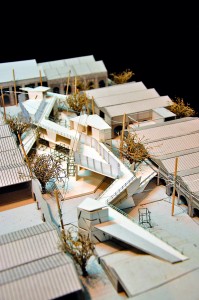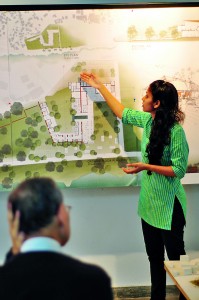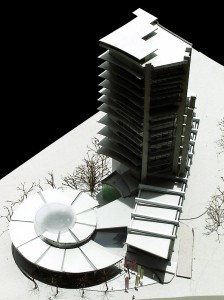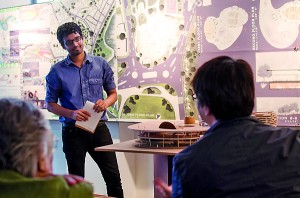City School of Architecture has a rich history
View(s):The City School of Architecture (CSA) with a history of twenty five years, offers a path in architectural education towards a career in  the building industry with a broad based teaching and learning process, rooted in the real world of practice. Its structured curriculum, design studios, theoretical and technology based education and the experiences of the practice of architecture within the learn and work, “sandwich concept” of the course, enables students to form working relationships and establish direct links with the construction industry. CSA is an accredited School of the Board of Architectural Education (BAE), of the Sri Lanka Institute of Architects (SLIA). It received The Royal Institute of British Architects (RIBA) full accreditation for its Parts I and II Courses in January 2011. CSA students successfully completing the Parts I & II Courses and Examinations will receive the internationally reputed exemption of the RIBA Part I and II Professional qualifications. This qualification will enable students to apply for RIBA International Membership.
the building industry with a broad based teaching and learning process, rooted in the real world of practice. Its structured curriculum, design studios, theoretical and technology based education and the experiences of the practice of architecture within the learn and work, “sandwich concept” of the course, enables students to form working relationships and establish direct links with the construction industry. CSA is an accredited School of the Board of Architectural Education (BAE), of the Sri Lanka Institute of Architects (SLIA). It received The Royal Institute of British Architects (RIBA) full accreditation for its Parts I and II Courses in January 2011. CSA students successfully completing the Parts I & II Courses and Examinations will receive the internationally reputed exemption of the RIBA Part I and II Professional qualifications. This qualification will enable students to apply for RIBA International Membership.
The School offers two courses of study:
The three year full time Part I Course
 End qualifications: CSA Diploma in Architectural Studies; UWE* BSc(Hons) Architecture; SLIA Part I exemption; RIBA Part I exemption.
End qualifications: CSA Diploma in Architectural Studies; UWE* BSc(Hons) Architecture; SLIA Part I exemption; RIBA Part I exemption.
Entry Requirements: Pass in GCE ‘O’Level Sri Lanka with Credit passes (or equivalent) in English and Mathematics Three passes in the GCE ‘A’ Level in one and the same sitting. Pass the aptitude test conducted by the CSA Pass the Interview Conducted by the CSA Candidates should have competency in written and spoken English to follow the course, as the course is conducted and examined in the English medium by local and foreign examiners. Candidates should have potential for creativity and  innovation and commitment for hard work, which includes theory, tutorial, field practical and design studio work. Expressing ideas through graphics is an added advantage and will be tested at the aptitude test. Candidates may bring to the interview a portfolio of work comprising of art or drawing work done by them in previous years.(optional). Candidates, who possess qualifications other than Sri Lanka GCE‘A’ level exam, should
innovation and commitment for hard work, which includes theory, tutorial, field practical and design studio work. Expressing ideas through graphics is an added advantage and will be tested at the aptitude test. Candidates may bring to the interview a portfolio of work comprising of art or drawing work done by them in previous years.(optional). Candidates, who possess qualifications other than Sri Lanka GCE‘A’ level exam, should  submit certification of the equivalence of such qualifications to the local ‘A’Levels, from the Department of Examination Sri Lanka, at the time of application.
submit certification of the equivalence of such qualifications to the local ‘A’Levels, from the Department of Examination Sri Lanka, at the time of application.
The three year Part II Course
End Qualification: CSA Higher Diploma in Architecture; UWE* Master of Architecture; SLIA Part II exemption; RIBA Part II exemption.
Entry Requirements: Possess CSA Diplomain Architectural Studies, or: Equivalent with exemption from the Sri Lanka Institute of Architects Part I examination, and: Possess one year of office experience under a Chartered Architect after Part I.
Application Application forms may be obtained from the CSA office from Tuesday to Saturdays in the month of August during office hours. Completed forms should be returned to the Registrar CSA at the beginning of September. Closing date will be notified in the newspaper in the month of August.
 Contact person: Registrar City School of Architecture 2nd Floor SLIA Building 120/7, Vidyamawatha. Colombo 7. Tel 2678254, 2678270 email: manager@csacolombo.edu.lk
Contact person: Registrar City School of Architecture 2nd Floor SLIA Building 120/7, Vidyamawatha. Colombo 7. Tel 2678254, 2678270 email: manager@csacolombo.edu.lk
CSA advocates an equal opportunities policy and encourages participation of male and female students. The diversity in age, cultural and social backgrounds in every batch of students, broadens students’ views and brings together diverse personalities to create a wholesome environment for higher learning.
Design is the core focus of the course and is conducted as interactive studios. An atmosphere of critical debate, innovative design thinking and a quest for creative design is encouraged through the faculty, tutors, critiques and resource persons drawn from the practice and academia, giving balanced teaching inputs.
Peer interaction and reviews are also encouraged.
Theory subjects, site and field visits, local and international visits experiencing architecture, joint study programmes with foreign universities, participation in local and foreign student conventions, apprenticing in a trainer practice – all offer the CSA students the necessary peripheral inputs to reinforce their design thinking and design skills to enrich them to become ‘Tomorrows Architects’.
Over 800 students have registered with the school; and of the nineteen batches that have gone through the portals of the school, many have established individual practices, whilst others have continued their education in academic institutions abroad, reading for Masters and Doctoral Degrees. Many Architects produced by the school have received awards and accolades locally and internationally.
Follow @timesonlinelk
comments powered by Disqus


